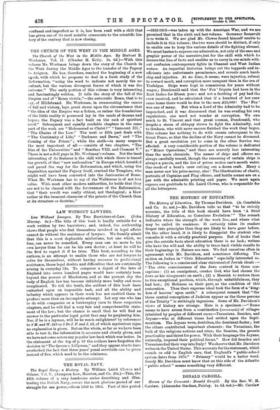THE CHURCH OF THE WEST IN THE MIDDLE AGES.
The Church of the West in the Middle Ages. By Herbert B. Workman. Vol II. (Charles H. Kelly. 2s. 6d.)—With this volume Mr. Workman brings down the story of the Church in the West during the Middle Ages to the transfer of the Papacy to Avignon. He has, therefore, reached the beginning of a new epoch, with which he proposes to deal in a fresh study of the Reformation, "using the word to indicate not merely the re- sultant, but the various divergent forces of which it was the outcome." The early portion of this volume is very interesting and fascinatingly written. It tells the story of the fall of the Empire and of "Boma victrix,"—the autocratic Rome, that is to Fay, of Hildebrand. Mr. Workman, in enumerating the causes of fall and victory, lays great stress upon the circumstance that "the idea of the Empire was a fiction, or rather the foundations of the little reality it possessed lay in the sands of dreams and hopes ; the Papacy was a fact built on the rock of spiritual need." Subsequent and equally readable chapters in the same part of the work are "Mohammed or Christ?" "Innocent "The Chains of the Law." The next or fifth part deals with "The Continuity of Life," "Darkness and Dawn," and "The Coming of the Friars " ; while the sixth—in many respects the most important of all — consists of two chapters, "The Rise of the Universities" and " Boniface VIII. and Clement T." There is not a dull page in Mr. Workman's volume. Not the least interesting of its features is the skill with which there is traced the growth of that "new nationalism" in Europe which heralded and paved the way for the Reformation, and which, using the Inquisition against the Papacy itself, crushed the Templars, who
might well have been converted into the Janissaries of Rome. What Mr. Workman has to say of the Waldenses is of not less
value. With most other modern authorities, he holds that they are not to be classed with the forerunners of the Reformation, that "their revolt was really ethical, not theological ; a blow rather at the immoral character of the priests of the Church than at its structure or doctrine."


















































 Previous page
Previous page